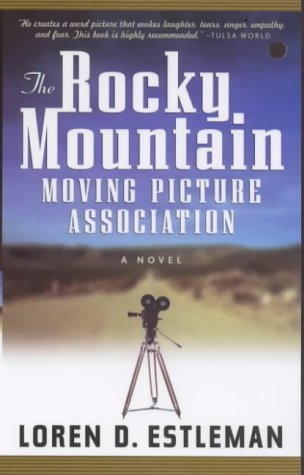The Rocky Mountain Moving Picture Association
Movies are a large part of everyone’s life today, whether viewed in theaters, seen as videos at home, or the basis of watercooler gossip at work. It’s therefore a distinct pleasure to read about the early days of the pre-Hollywood motion picture industry, back in the days of makeshift sets, mind-melting lighting systems and hand-cranked cameras.
People did what they had to in order to get those dazzling images up on the screen. In this novel Buck Bensinger’s leading lady Adele Varga is a former Mexican prostitute. She’s also the producer, the secretary, the bookkeeper, and when she needs to be, she’s the company’s publicity director. Buck’s new leading man is an ex-convict, just released from San Quentin.
In the real world, before he started making movies, D. W. Griffith (to pick just one example) was a cash boy in a dry goods store. Other recognizable names are bumped into now and again, as Buck tries his best to get his latest two-reel epic finished. The villain, though? Surprise of surprises, none other than Thomas Alva Edison, dubbed by Buck as “The Lizard of Menlo Park.” Twenty years after coming up with the moving picture process, Edison discovered that there was money to be made from the idea, and he helped form a monopolistic trust (the Motion Pictures Patents Company) whose sole function was to keep anyone else from making movies.
Driven from the East Coast, the early pioneers in the field were forced westward to California, where they finally made their stand. And where they faced vandalism, kidnappings, wide-scale destruction of movie lots, and worse.
People in on the early days of anything are not always aware of their eventual footnoted places in history, and it’s left to others to look back later and marvel at their accomplishments. Giving us the same perspective in this story is Tom Boston, a would-be writer born Dmitri Pulski, the son of a northern California iceman. Sent by his father to negotiate a sale of eight tons of ice to the Rocky Mountain Picture Association, Tom finds life in the sunny south much more to his liking. What he receives, along with a paycheck, is a ringside seat to the birth of a new industry.
What happens next is pure fiction, a novel too good to be fiction, and if it didn’t really happen, it should have.










